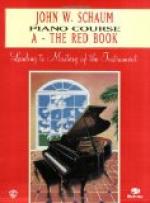MEMORIZING
“In regard to memorizing, I have no special rule or method. Committing to memory seems to come of its own accord. Some pieces are comparatively easy to learn by heart; others, like a Bach fugue, require hard work and close analysis. The surest way to learn a difficult composition, is to write it out from memory. There is a great deal of benefit in that. If you want to remember the name of a person or a place, you write it down. When the eye sees it, the mind retains a much more vivid impression. This is visual memory. When I play with orchestra, I of course know every note the orchestra has to play as well as my own part. It is a much greater task to write out a score from memory than a piano solo, yet it is the surest way to fix the composition in mind. I find that compositions I learned in early days are never forgotten, they are always with me, while the later pieces have to be constantly looked after. This is doubtless a general experience, as early impressions are most enduring.
“An orchestral conductor should know the works he conducts so thoroughly that he need not have the score before him. I have done considerable conducting the past few years. Last season I gave a series of historical recitals, tracing the growth of the piano concerto, from Mozart down to the present. I played nineteen works in all, finishing with the Rachmaninoff Concerto.”
Mr. Gabrilowitsch has entirely given up teaching, and devotes his time to recital and concert, conducting, and composing.
HANS VON BUeLOW AS TEACHER AND INTERPRETER
Those who heard Hans von Buelow in recital during his American tour, in 1876, listened to piano playing that was at once learned and convincing. A few years before, in 1872, Rubinstein had come and conquered. The torrential splendor of his pianism, his mighty crescendos and whispering diminuendos, his marvelous variety of tone—all were in the nature of a revelation; his personal magnetism carried everything before it. American audiences were at his feet.
[Illustration: HANS VON BUeLOW]
In Von Buelow was found a player of quite a different caliber. Clarity of touch, careful exactness down to the minutest detail caused the critics to call him cold. He was a deep thinker and analyzer; as he played one saw, as though reflected in a mirror, each note, phrase and dynamic mark of expression to be found in the work. From a Rubinstein recital the listener came away subdued, awed, inspired, uplifted, but disinclined to open the piano or touch the keys that had been made to burn and scintillate under those wonderful hands. After hearing Von Buelow, on the other hand, the impulse was to hasten to the instrument and reproduce what had just seemed so clear and logical, so simple and attainable. It did not seem to be such a difficult thing to play the piano—like that! It was as though he had said: “Any of you can do what I am doing, if you will give the same amount of time and study to it that I have done. Listen and I will teach you!”




